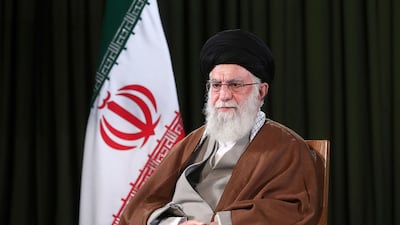French researcher Roland Marchal returned to Paris on Saturday after being imprisoned in Iran for over nine months.
"Roland has returned," his support group announced in a short message.
A supporter told AFP that the freed researcher had been taken to a military hospital near Paris to assess his condition.
Mr Marchal's release is part of a prisoner swap after France freed Jalal Ruhollahnejad, Iranian state broadcaster IRIB reported.
Mr Ruhollahnejad is an Iranian engineer wanted by the United States on sanctions-related charges.
IRIB said on Friday that Mr Marchal, "who was sentenced to five years' imprisonment for acting against national security, ... had his sentence reduced and was released from prison today and handed over to the French embassy in Tehran”.
French President Emmanuel Macron urged Iranian authorities to also release Mr Marchal's colleague Fariba Adelkhah, a French-Iranian dual citizen, the official said.
Mr Marchal's release comes as Iran battles a coronavirus outbreak that has infected about 20,000 people and killed more than 1,400.
Authorities have freed about 85,000 prisoners as Tehran tries to curb the spread of Covid-19.
In a speech on Friday to mark Nowruz, the Iranian New Year, Supreme Leader Ayatollah Ali Khamenei said he would pardon 10,000 convicts including political prisoners.
Tehran this week granted a medical furlough to US Navy veteran Michael White, who has been imprisoned for more than a year, while British-Iranian Nazanin Zaghari-Ratcliffe, imprisoned since 2016, was temporarily released and allowed to live at her parents' home in the Iranian capital until April 4.
Mr Marchal, a senior researcher at France's Sciences Po university, was detained at the same time as Ms Adelkhah while visiting her, according to Said Dehghan, a lawyer representing both academics.
He said Mr Marchal was accused of "collusion against national security", while Ms Adelkhah was accused of espionage, spreading "propaganda against the political system" and "conspiracy against national security", Mr Dehghan said.
The espionage charge was later dropped.
Mr Macron and Foreign Minister Jean-Yves Le Drian had called for both academics to be released.
“We know that they are not in a very good condition and that they are not always being treated well. We think Iran would give a strong signal by releasing them,” Mr Le Drian said in early February.
Ms Adelkhah went on a hunger strike for six weeks from late December.
"Her mental and physical condition is not good; she has been weakened," Mr Dehghan said after she ended her protest on February 12.

